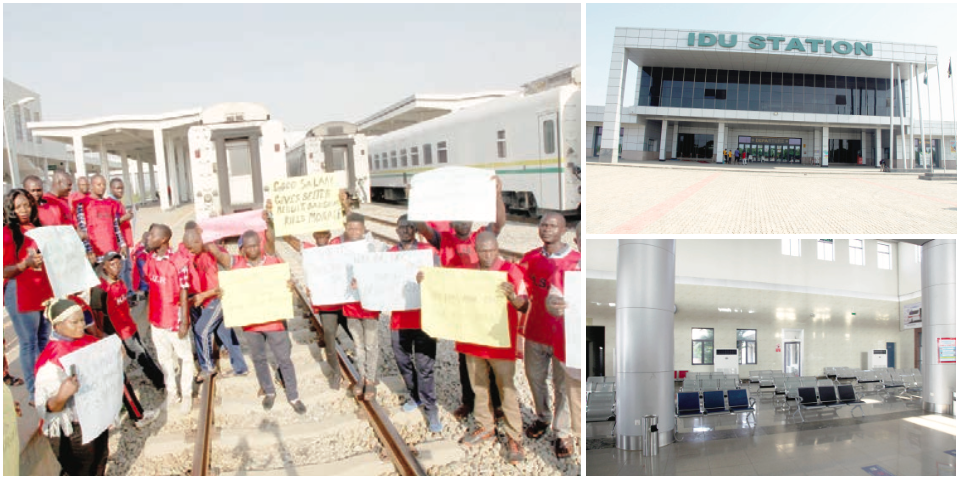The failure by the federal government to listen to the demands of railway workers recently led to a three-day warning strike that had devastating consequences on people, goods and services. In compliance with the directive of union leaders, workers of the Nigerian Railway Corporation (NRC) under the aegis of the Nigeria Union of Railway Workers (NUR) and Senior Staff Association (SSA) of the Nigerian Railway branch stayed away from work for the period of the warning strike – from Thursday November 18 through Saturday, November 20, 2021.
In a letter addressed to the Managing Director of the NRC, the President-General of NUR, Innocent Ajiji and President of SSA, NRC branch, Aliyu Mainasara, noted that their members were compelled to proceed with a warning strike after extensively waiting for a positive response that never came from the management. The demands of railway workers revolve around poor welfare and conditions of service. Leaders of the NUR argue that Nigeria’s railway workers receive the lowest and the poorest salaries out of all the parastatals under the Federal Ministry of Transport (FMoT).
General Secretary of NUR Comrade Segun Esan said while the value of the entire railway infrastructure including the locomotive and coaches may well be over N2.5bn, drivers of the locomotive equipment collect as low as N26,000 per month. This claim, if it’s true, contravenes the National Minimum Wage ACT which prescribes N30,000 as the least monthly salary payable to a worker in Nigeria. The pitiable treatment of railway workers is an unfair alienation of those who toil to make huge profits for the NRC.
Details of the grievances over which the warning strike was declared include the non-payment of promotion arrears for 2018, 2019, 2020 and 2021; unpaid monthly salaries of some workers especially those who joined the service in 2019; transfer of workers without adequate provision for their accommodation and relocation allowances; deliberate refusal to complete the review of conditions of service even though the last review exercise was in 1978; non-payment of allowances to workers who work even on weekends and beyond 40 hours a week as clearly prescribed by the Public Service Rules; undue conversion of some workers in NRC’s industrial clinics from CONHESS to CONPSS salary regime and generally deplorable working conditions.
The warning strike, which successfully crippled train operations on the Abuja-Kaduna, Lagos-Ibadan, and Itakpe-Warri rail-lines incurred huge losses. An estimated N19m was lost daily by the NRC from its almost 5,000 daily passenger traffic on the Abuja-Kaduna corridor alone. Aside the huge losses suffered by the NRC for the three-period when train services were suspended, petty traders whose small businesses depend on train services also had their share of the loss. The strike equally imposed painful hardships on stranded passengers.
Following meetings between the unions and the NRC board, the management and the FMoT in Abuja, the warning strike was thereafter suspended on Saturday November 20, 2021 and a committee was set up to review the existing conditions of service for railway workers. It was also resolved that all the train crews be given insurance cover while enhanced salary regime would be prioritised by the NRC Board and FMoT.
Rising insecurity in recent times made trains the preferred choice of transportation for many Nigerians, especially from Abuja to Kaduna and from Lagos to Ibadan. It would be ridiculous and counter-productive if, in spite of recent strategic efforts by government to resuscitate rail transportation in the country, the sector is so soon faced with labour crisis.
The usual refusal by government to honour agreements reached with labour unions is condemnable in strong terms. This unwelcome norm that characterises government’s response to workers’ demands lends credence to the insinuation among Nigerian workers that “strike is the only language understood by government”. While we call on the authorities to vacate this lackadaisical attitude of allowing agitation by workers to degenerate into an industrial action before responding to their demands, we urge them to quickly address the demand by railway workers for enhanced wages and other welfare matters.
Daily Trust urges the committee set up to review the conditions of service for railway workers to complete its assignments within a reasonable time frame. The implementation of the committee’s recommendations should, thereafter, not suffer any administrative or financial bottlenecks. Rail transport is cheaper, friendlier, safer, and faster. Government, therefore, should be seen to be committed to giving the welfare of railway workers the attention it deserves.

 Join Daily Trust WhatsApp Community For Quick Access To News and Happenings Around You.
Join Daily Trust WhatsApp Community For Quick Access To News and Happenings Around You.


